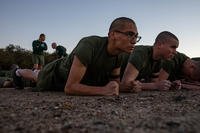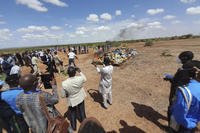Faced with a growing crisis of losing more pilots to the civilian airline industry, the Air Force may have to use a stop-loss measure -- an involuntary extension of service -- to retain as many trained pilots as it can.
But it would do so only as a last resort, an official told Military.com on Tuesday.
"Every idea is on the table and worthy of discussion," said Col. Chris Karns, spokesman for Air Mobility Command.
His comments came after an article in CQ Roll Call quoted AMC's commander, Gen. Carlton Everhart II, saying, "I said to the industry … if we can’t meet the requirements, the chief could drop in a stop-loss -- and you need to understand that."
Karns reiterated what Everhart said last week during a discussion with reporters that the industry needs to take the lead in providing options for sharing pilots.
"Pilot shortage is a problem set requiring the input of multiple stakeholders and the need to look at every available option," Karns said in an email. "While actions such as stop-loss are an absolute last resort, it is an action available to the Air Force."
Karns said it would be up to Chief of Staff Gen. David Goldfein and Air Force headquarters staff to determine if stop-loss would be the best -- or only -- option should the airline industry not comply with more viable options.
"It is important that there is full understanding of the seriousness of this issue and the need for all parties to actively work together toward a solution," he said.
He continued, "Industry could serve as potential partners in a range of possible ideas to include sabbaticals, debt forgiveness, or possibly the establishment of simulator campuses to offset the number of flying hours required to be a commercial airline pilot. The meeting will help determine the realm of possible."
Everhart has discussed similar ideas, and hopes to bring them to the airline industry during a meeting with officials May 18 at Joint Base Andrews in Maryland.
Everhart said he plans to attend the meeting -- which is actually the third such get-together involving military and airline officials -- along with Goldfein, headquarters Air Force and operations personnel, airline industry representatives and regional airline officials, as well as colleagues from the Army, Marine Corps and the Navy.
Academic institutions such as Embry Riddle University, an aeronautical university specializing in aviation and aerospace, and civil reserve airfleet institutions such as FedEx or UPS may also attend, Everhart said. RAND Corp., a nonprofit institution that provides research and analysis studies on public policy, will also sit in for research purposes, he said.
"The nation cannot afford to gap or compromise national defense, Karns said. The military is a feeder system for the airlines and industry.
"It is important that people understand that secondary and tertiary effects of any decision will be looked at hard," he said.
-- Oriana Pawlyk can be reached at oriana.pawlyk@military.com. Follow her on Twitter at @Oriana0214.





























